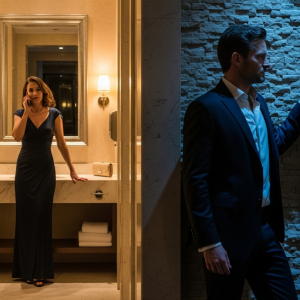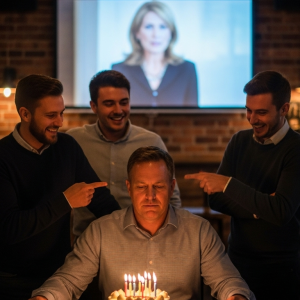The email arrived on a Tuesday, cold and impersonal, devoid of any warmth or familiarity. It wasn’t an invitation; it was a summons. It came not from a person, but from a prestigious law firm, its digital letterhead a stark reminder of the world I was about to enter.
Mr. Arthur Sterling requests the presence of his son, Mr. David Sterling, and his companion, Miss Eva Peters, for a formal dinner at his private residence.
My heart hammered against my ribs. For two years, David’s father had been a ghost in our lives, a legendary figure spoken of in hushed, reverent tones. Arthur Sterling was a titan of the financial world, a self-made billionaire who had built an empire from nothing and then, a decade ago, had vanished from public life entirely, retreating into the gilded cage of his sprawling, walled estate. He was, by all accounts, a brilliant eccentric, a man whose approval was as rare and coveted as a flawless diamond.
This was it. The meeting David had been both hoping for and dreading since the day we met.
“You don’t understand, Eva,” David said that night, pacing our small apartment like a caged animal. His usual confident demeanor had evaporated, replaced by a raw, nervous energy. “This isn’t a normal ‘meet the parents’ dinner. My father… he doesn’t do normal. This is a test. Everything with him is a test.”
He handed me a small, expensive-looking gift box. Inside, nestled on a bed of silk, was a soft, navy blue cashmere scarf.
“You have to wear this,” he said, his voice tight. “And the navy dress I bought you. He values appearances above all else. And for the love of God,” he grabbed my shoulders, his eyes wide with a desperate plea, “do not be late. He believes tardiness is a sign of a disordered mind.”
He then proceeded to give me a list of conversational rules, a minefield of forbidden topics. “Don’t talk about your job at the non-profit; he thinks charity is a weakness. Don’t mention your parents’ humble background. Stick to safe subjects: art, history, economics. He needs to see that you’re… suitable.”
I looked at the man I loved, a man usually so full of life and confidence, now reduced to a trembling wreck by the mere thought of his father’s judgment. It was a terrifying glimpse into the world that had shaped him, a world where love was conditional and worthiness was constantly being measured. I felt a knot of anxiety tighten in my own stomach. This wasn’t just a dinner; it was an audition for a role I wasn’t sure I wanted to play.
The day of the dinner was a symphony of overwhelming pressure. I spent the morning preparing, not for a pleasant evening, but for a high-stakes performance. I rehearsed my “safe” topics in the mirror, my own voice sounding foreign and stilted. The beautiful cashmere scarf felt less like a gift and more like a costume, a piece of a character I was meant to embody.
The plan was for me to take the train to his town, a wealthy, secluded enclave an hour outside the city. David was already there, “preparing the ground,” as he put it. The anxiety was a constant, churning feeling in my gut. I wasn’t just nervous about meeting the formidable Arthur Sterling; I was terrified of disappointing David, of failing this arbitrary test that held our future in its grasp.
Stepping off the train, I felt like an intruder. The air itself seemed different here, cleaner, rarefied. The station led out onto a quiet, impossibly green road, lined with sprawling mansions hidden behind towering hedges and ornate iron gates. The sheer scale of the wealth was suffocating. My destination was a mile’s walk, and seeing I had a few minutes to spare, I decided to walk to clear my head.
That’s when I saw him.
He was sitting on a park bench, a solitary figure in a world that seemed to have forgotten him. He was an elderly man, his clothes clean but worn, his face etched with the deep, tired lines of a hard life. A cool breeze swept through the trees, and he shivered, pulling his thin jacket tighter around his frail frame. He looked lost, hungry, and completely, utterly alone.
My first instinct, conditioned by a week of David’s frantic instructions, was to walk past. Don’t get involved. Don’t be late. Don’t do anything that could be perceived as a weakness. But then, my grandmother’s words, a gentle echo from my childhood, surfaced in my mind: “The true measure of your character, my dear, is how you treat someone who can do nothing for you.”
To hell with the test.
I stopped and approached the bench. “Excuse me, sir,” I said softly. “Are you alright?”
He looked up, and I was struck by his eyes. They were a clear, intelligent blue, startling in their clarity against his weathered face. “Just a bit cold, young lady,” he said, his voice a low, raspy whisper. “And I seem to have missed the lunch service at the local shelter.”
I looked down at the simple turkey and Swiss sandwich on whole wheat I had packed for the train ride. Without a second thought, I took it out of my bag. “Here,” I said, offering it to him. “It’s not much, but it’s yours.”
He looked from the sandwich to my face, a strange, unreadable expression in his eyes. He finally took it with a quiet nod. “Thank you,” he said. “That is very kind.”
He shivered again, and on an impulse, I unwrapped the expensive cashmere scarf from my neck. It was the one David had insisted I wear, a symbol of my suitability. “You need this more than I do,” I said, gently draping it over his thin shoulders.
He looked down at the soft fabric, then back up at me. His intelligent eyes seemed to see right through me, past the carefully chosen dress and into the heart of the woman I was. “You are a very kind woman,” he said.
I just smiled, wished him well, and then, checking my watch, realized with a jolt of panic that I was now officially, irrevocably, going to be late.
I practically ran the last quarter-mile, my heels sinking into the soft, manicured grass that lined the private road. The massive wrought-iron gates of the Sterling estate loomed before me, an imposing barrier between two worlds. I announced myself through the intercom, my voice trembling slightly, and the gates swung open with a silent, heavy grace.
David was waiting for me on the grand stone steps of the portico. He was not smiling. He was pacing back and forth, a caged animal of pure anxiety, his phone clutched in his hand. The moment he saw me hurrying up the steps, his face, already pale with worry, contorted into a mask of raw, unfiltered anger.
“Eva! Where in God’s name have you been?” he hissed, his voice a low, furious whisper as he rushed to meet me, grabbing my arm. “You are seventeen minutes late! Seventeen! He hates tardiness! I told you this! I told you how important this was! This is a disaster, a complete and utter disaster!”
“I’m so sorry, David,” I said, breathless from my run. “I’m so sorry. I was walking from the station and there was this old man on a park bench—”
He stared at me as if I had just started speaking in a different language. “An old man?” he repeated, his voice filled with a stunned, horrified disbelief. “A person in need? You were late to a meeting with my reclusive billionaire father, a meeting that will decide the entire future of our lives, because you stopped to chat with a person in need?”
“I didn’t chat,” I said, a flicker of defiance cutting through my own anxiety. “I gave him my sandwich. He was hungry, David.”
It was then that his eyes fell to my neck. His face, which was already a mask of fury, seemed to contort even further. “And where,” he asked, his voice now dangerously quiet, “is your scarf? The cashmere scarf. The one I bought you specifically for this meeting.”
“I gave it away,” I whispered. “He was so cold.”
“You gave it away?” he repeated, his voice rising to a choked, incredulous squeak. “A seven-hundred-dollar scarf to a bum? Eva, what is wrong with you? Do you have any idea what is on the line tonight? This isn’t a game! This isn’t one of your non-profit charity cases! This is my father!”
He wasn’t worried about me. He wasn’t even angry, not really. He was terrified. He was a scared little boy, desperate for the approval of a father he barely knew. And in that moment, he saw me not as his partner, but as a liability, a loose cannon who had just jeopardized his inheritance. The cruelty of it, born of his own fear, was a painful thing to behold.
Just then, the massive, carved oak doors of the mansion swung open. A tall, impossibly thin butler in a classic black and white uniform stood there, his face an impassive mask. “Mr. Sterling will see you now,” he announced, his voice as dry as old paper.
David straightened his tie, his panic returning. He grabbed my hand, his grip cold and sweaty. “Just let me do the talking,” he whispered frantically. “Smile. Be polite. Don’t mention the man on the bench. Don’t mention the scarf. Just… please, Eva, try not to say anything foolish.”
He pulled me through the doorway into a foyer so vast and silent that the sound of our footsteps echoed on the black and white marble floor. The air was cool and still, and the walls were lined with priceless works of art, watched over by the stern, painted eyes of what I assumed were generations of Sterling ancestors. This house was not a home; it was a museum, a cold, unloving gallery of wealth and power.
The butler led us down a long, silent hallway. With every step, my heart pounded a slow, heavy rhythm against my ribs. I felt like I was walking the green mile on my way to my own execution. The butler stopped in front of a pair of towering dark wood doors. “Mr. Sterling is waiting for you in the main dining room,” he said, and then pushed the grand doors open.
The room was magnificent. A single, impossibly long mahogany table, polished to a dark mirror-like shine, stretched the length of the room. A glittering crystal chandelier hung from the high, vaulted ceiling like a captured constellation of stars. And at the far end of that table, seated in a high-backed chair that looked more like a throne, was a single, solitary figure.
My mind was a frantic storm of denial. It’s not him. It can’t be. It’s just a coincidence. An old man in similar shabby clothes. You’re distressed, you’re seeing things.
But then the man moved. He lifted a hand to his neck, and I saw it. Draped elegantly over the shoulders of his threadbare jacket was my cashmere scarf.
I froze in the doorway, my feet refusing to move, my body turning to ice. David, finally noticing I was no longer beside him, stopped and turned, whispering frantically, “Eva, what is it? What are you staring at?”
And then he followed my gaze down the long, intimidating length of that table. And he saw his father. The reaction was a sight to behold. David, the man who had spent the last week treating me like a fragile, incompetent child, now looked like a terrified little boy himself. The color drained from his face, his confident posture completely collapsed, and a small, strangled sound—half gasp, half whimper—escaped his lips.
“Father?” he squeaked, his voice a disbelieving whisper. “What… what are you doing? What are you wearing?”
The man at the end of the table did not answer his son. He didn’t even look at him. His eyes—those same clear, intelligent blue eyes that had looked at me with such quiet dignity on the park bench—were fixed on me. And he smiled. A warm, genuine, and completely familiar smile.
“Welcome, Eva,” he said, his voice the same kind, raspy whisper I had heard an hour before. “Please, come in. Have a seat.”
I walked the long, lonely expanse of the dining room, my footsteps echoing in the cavernous silence. I took the seat he gestured to, the one to his right, the seat of honor. David, after a long, agonizing moment, finally found the use of his legs and shuffled to a chair at the far distant end of the table, as far away from the center of power as he could possibly get.
The butler entered and began to serve the first course of what I now knew would be the most excruciatingly awkward dinner of my fiancé’s life. The conversation, when it began, was not between father and son. It was between Arthur and me.
He didn’t ask about my finances, my education, or my family’s social standing. He asked about the book I was currently reading. He asked about my work at the inner-city non-profit, the very job David had begged me not to mention. I told him the truth, my voice gaining confidence with every sentence. I told him about the community garden we were building, about the kids I was mentoring. He listened with a genuine, intelligent interest, asking sharp, insightful questions.
He asked about my childhood, and I told him about my parents, a teacher and a nurse who had raised me in a small house filled with love, but very little money. I told him about the values they had instilled in me: the importance of kindness, the dignity of service, the responsibility we have to look after one another.
“They sound like good people,” he said. “They raised a remarkable daughter.”
When the main course was cleared, he reached up and reverently unwrapped the cashmere scarf from his shoulders. “I believe this is yours,” he said, his eyes twinkling. He handed it back to me. It was still warm.
“Thank you,” I managed to say.
“No, thank you,” he said, his voice soft. “It was a great comfort.”
The dinner was a profound and deeply personal interview. As we talked, I realized what was happening. He wasn’t just getting to know me. He was showing his son, in the most clear and devastating way possible, all the things he had failed to see in me himself. He was showing David that the qualities he had urged me to hide—my humble background, my compassionate nature, my “unimpressive” job—were the very qualities his father valued most in the world.
When the meal was finally over, Arthur walked us to the door. He addressed his son for the first time that evening.
“You have a remarkable woman here, David,” he said, his voice quiet but firm. “Do not make the mistake of underestimating her, or her values, ever again. Your place in my company, and in my life, is secure—not because of your own merits tonight, but because of hers. Now, go home and be the man she deserves.”
The car ride back to our apartment was a long, heavy silence. David drove with his eyes fixed on the road, his face a grim mask of shame. When we were finally back in our own living room, he broke. He sat on the edge of our sofa and wept, his body wracked with a shame so profound it was painful to watch. He apologized, not just for his behavior on the porch, but for the entire two years of our relationship—for his cowardice, for his obsession with his father’s approval, for trying to make me into someone I was not.
It was the most honest and vulnerable I had ever seen him. And I knew, in that moment, that our relationship was not over. It was just beginning.
Our wedding, three months later, was a small, quiet, and beautiful affair. It was not at a country club; it was in the sunlit backyard of my own parents’ home. And Arthur Sterling was there. He was not dressed as a person in need. He was dressed in a beautifully tailored suit, but draped around his shoulders, worn like a medal of honor, was my cashmere scarf.
He was not the scary, reclusive billionaire anymore. He was just my father-in-law. And as I stood there, saying my vows to a new, more humble, and infinitely more deserving David, I thought about the nature of tests. I had walked onto that estate terrified of failing a superficial test of appearances. I had failed it spectacularly. And in doing so, I had passed the only test that ever truly mattered.




